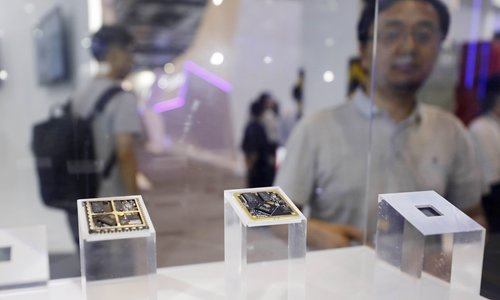Beijing steps up efforts to ramp up chipsets manufacturing and supply
Source: Global Times Published: 2020/8/20 21:33:40

Chips developed by domestic autonomous driving solution provider Horizon Robotics are displayed at the WAIC 2019 in Shanghai. Photo: Yang Hui/GT
China will step up efforts to catch up with global competitors and fulfill its ambition to realize a chipset self-sufficiency rate of 70 percent by 2025, according to industry experts, noting that it has become an increasingly urgent issue as the US tightens China's access to US-made microchips.
Analysts suggest the promotion of government support could be used to achieve the goal, meaning that domestic chipmakers can replace foreign chip makers and feed high-tech companies in China such as Huawei.
Currently, only 30 percent of China's chipsets are provided by China's own enterprises, according to a report by China Central Television.
"Providing support for more domestic chipmakers is key for other high-tech industries, and it has become an urgent strategic issue, considering the threat from the US government which has tried to thwart Chinese semiconductor industry," Geng Bo, a vice secretary-general of the China Solid State Lighting Alliance, a semiconductor industry association, told the Global Times.
The US has been tightening its grip on semiconductor chip supplies in its conspiracy to "incapacitate" Chinese high-tech companies.
In the most recent export ban, updated by the US Department of Commerce, Huawei was barred from access to semiconductors made with any US technology, including outsourcing production from any company that uses US equipment, such as the Taiwan Semiconductor Manufacturing Company (TSMC) and Semiconductor Manufacturing International Corporation (SMIC) on the Chinese mainland.
The Chinese government has been pushing to support domestic semiconductor companies as alternatives to foreign suppliers. China's State Council unveiled a list of policies aimed at driving the growth of the domestic semiconductor sector, through introducing preferential taxation policy.
SMIC's profits soared more than six times to $138 million year-on-year, and its revenue rose by 18.7 percent to $938 million in the second quarter of this year. Most of the company's revenue was from the Chinese mainland and Hong Kong, according to information published on the Hong Kong Stock Exchange.
China has been slowly reducing its dependence on chips imported from overseas. In 2019, the total value of chips imported to China edged down 2.6 percent compared to 2018, dropping $8 billion. However, according to the General Administration of Customs, the total value of chipsets — $304 billion — far exceeds the value of any other imports.
Global Times
Posted in: INDUSTRIES